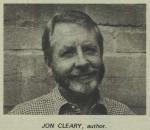Jon Cleary grew up as part of a large and impoverished working-class Catholic family in the inner Sydney suburb of Erskineville. Educated by the Marist brothers in Randwick, Cleary was forced by poverty to leave school before he turned fifteen. He worked in a wide variety of jobs, including as a film cartoonist, salesman, laundryman and commercial artist, and was often out of work, before joining the Australian Imperial Force in 1940 and serving in the Middle East and Papua New Guinea.
In 1941, the Daily Mail (Sydney) awarded Cleary fifty pounds for a short story and asked him to contribute to the paper; Cleary wrote 1,000 words per week for the next two years. In 1946, Cleary's You Can't See Round Corners won second prize in the Sydney Morning Herald's novel writing competition, coming second to Ruth Park's The Harp in the South. Cleary used the prize money to pay for a passage to England. He spent the following decades living in Europe and the United States and worked as a journalist for the Australian News and Information Bureau in London and New York from 1948 to 1951. Cleary's novels from this period were mostly international thrillers or adventure stories, dealing with issues such as Nazism and Third World oppression, but many featured Australian characters.
After returning to Australia, Cleary settled in Kirribilli and concentrated on a series of detective novels set in Sydney. The central character was police officer Scobie Malone. Cleary drew upon many aspects of his own background for the character of Malone, and his extensive knowledge of Sydney provided a realistic and detailed backdrop for the novels.
Over the course of his life, Jon Cleary became one of Australia's most prolific and commercially successful authors, selling more than eight million copies of his novels internationally. The Sundowners (1951) alone has sold more than three million copies. Cleary enjoyed the rare distinction that all of his novels were first published in hardback and many of his novels have been made into films. He also written many scripts for radio and television.
Cleary was married to author Joy Cleary (q.v.) from 1946 until Joy's death in 2003.
 8188340973208580724.jpg
8188340973208580724.jpg